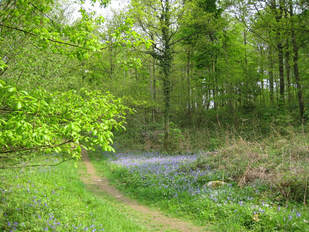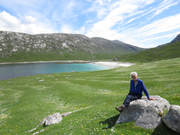
'What I saw
Was Adlestrop - only the name
And willows, willow-herb, and grass,
And meadowsweet, and haycocks dry--
And for that minute a blackbird sang
Close by, and round him, mistier,
Farther and farther, all the birds
Of Oxfordshire and Gloucestershire.'
Home from abroad in May, I chose an English bluebell wood and we spent a day in Somerset. Long Wood and Velvet Bottom, awash with bluebells. Had we ever seen anything so glorious, asked a Canadian couple whom we met among the bluebells beneath beech leaves unfurling fresh and bright. Yes, when last I was here in springtime in this bluebell wood alive with birdsong.
I seem to have known and loved 'Adlestrop' almost as long as I've loved a bluebell wood. And on rainy days it's a delight to return to poetry and prose which seeks to capture their essence. Of English woodlands, and countryside.
I recently heard a Welshman speaking with pride of being Welsh as he mended a stone wall in Snowdonia. His father and grandfather had worked as agricultural labourers here before him and this landscape defines who he is, his heritage through generations. That struck a chord.
So, for landscape and for all the birds of Oxfordshire and Gloucestershire what hope is there? Late June 2018 and Countryfile had a feature on Sir James Dyson whose vision for farming in Oxfordshire, Gloucestershire and Lincolnshire gives hope for the future. He has the vision and the resources to plan long-term. He has planted miles of hedgerows and looks to stewardship of the countryside. He seeks to minimize the use of chemicals, to tread lightly. It's high-tech and forward-looking. The production of food is in harmony with conservation. An investment in the future.
Edward Thomas wouldn't recognise the Dyson 21st century agricultural landscapes but perhaps there's hope for the birds of Oxfordshire and Gloucestershire. And perhaps I might return to vacuuming with a renewed enthusiasm.

 RSS Feed
RSS Feed